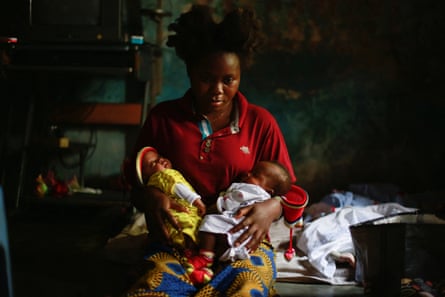In an attempt to lower the high incidence of maternal and newborn fatalities in the Democratic Republic of the Congo, free healthcare will be provided to expectant mothers throughout the nation.
By year’s end, pregnant women and the month following childbirth in 13 of the 26 areas of the nation will be eligible for free care. The program, which the government intends to expand to the rest of the Democratic Republic of the Congo (DRC) but has no set timeline for it, will provide free healthcare to babies for the first 28 days of their lives.
Health professionals, meanwhile, are worried that hospitals and medical facilities lack the necessary resources to handle any rise in demand for their services.
The $113 million (£93 million) World Bank-supported program could not be implemented successfully because there was insufficient staff, infrastructure, or equipment.
The program’s launch coincides with a nationwide walkout by healthcare workers demanding improved working conditions and increased compensation, including nurses, midwives, technicians, and administrative personnel.
The number of maternal and newborn deaths in Congo is among the highest worldwide. According to the most recent data, there are 547 maternal deaths for every 100,000 live births, and 27 neonatal deaths—that is, babies who pass away before becoming 28 days old—for every 1,000 live births. The figures are far behind the UN’s standards, which call for fewer than 70 maternal and newborn deaths per 100,000 and 12 fatalities per 1,000, respectively.
Roger Kamba Mulamba, the minister of public health, declared that the initiative will release women from a “prison sentence.” “Mothers today receive healthcare without fear when they become pregnant,” he stated. Modern babies do not perish because they cannot get antibiotics. These days, mothers do not pass away because they cannot afford to have a cesarean section performed.

Ultrasounds can cost 60,000 Congolese francs (£8), while general checks can cost roughly 27,000 francs (£8) in public health centers. It costs roughly 524,000 francs for a C-section. Over 60% of Congolese people live on less than $2.15 (5,600 francs) each day, according to the World Bank.
Since there is no universal health care in the DRC, most individuals cannot afford the meager care that is available. It is common for hospitals to hold patients until their medical bills are fully paid. Some recently arrived women have been compelled to spend weeks in overcrowded institutions while their families look for alternatives.
After being introduced in September in the nation’s capital, Kinshasa, the program is currently being expanded throughout the nation, including the war-torn eastern Democratic Republic of the Congo. According to the health ministry, the program, which is the first of a $200 million initiative for prenatal, maternal, and neonatal care, is costing $42 million. It claimed to be informing women about the free services via radio and television.
The program was welcomed by Dr. Simplice Kibatatu of Kinkole General Hospital, which is located outside of Kinshasa. However, he stated that the volume of women seeking attention at his health center had become overwhelming.
He stated, “We went from 30 women to about 65 women delivering each month.” Around 10 a.m., expectant mothers began to arrive. They are showing up early, at about 8am, eager for a consultation now that the service is free.
The experimental program was dubbed a disaster by Claudel Diakileke, a technician at the maternity center in the Kinshasa area of Barumbu. He claimed that the government had not given health centers sufficient supplies or medications, and that there were not enough physicians or certified midwives to fulfill demand.
To care for the approximately 95 million people in the nation, there are approximately 9,500 physicians and 73,000 nurses. There is a single midwife for every 20,000 residents.
He continued by saying that several women were worried about the standard of care.
Dressmaker Filo Biancumpa, who is also six months pregnant, expressed her happiness with the program but said, “I had no idea that free birth delivery was happening.” Every time I visit this health center, I discover that the medical staff is on strike. Speaking with female healthcare professionals who advise expectant mothers is not possible.

